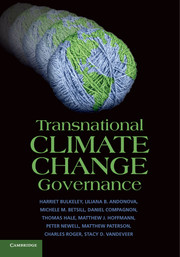Book contents
- Frontmatter
- Contents
- List of Figures and Tables
- Acknowledgements
- Acronyms and Abbreviations
- 1 Introducing Transnational Climate Change Governance
- 2 Mapping the World of Transnational Climate Change Governance
- 3 Theoretical Perspectives on Transnational Governance
- 4 Origins, Agency and the Forms of Transnational Climate Change Governance
- 5 Constructing Transnational Climate Change Governance Issues and Producing Governance Spaces
- 6 The Uneven Geography of Transnational Climate Change Governance
- 7 Understanding Authority and Legitimacy in Transnational Climate Change Governance
- 8 Making a Difference? Tracing the Effects and Effectiveness of Transnational Climate Change Governance
- 9 Conclusions – Looking Beyond Transnational Climate Change Governance
- References
- Index
5 - Constructing Transnational Climate Change Governance Issues and Producing Governance Spaces
Published online by Cambridge University Press: 05 August 2014
- Frontmatter
- Contents
- List of Figures and Tables
- Acknowledgements
- Acronyms and Abbreviations
- 1 Introducing Transnational Climate Change Governance
- 2 Mapping the World of Transnational Climate Change Governance
- 3 Theoretical Perspectives on Transnational Governance
- 4 Origins, Agency and the Forms of Transnational Climate Change Governance
- 5 Constructing Transnational Climate Change Governance Issues and Producing Governance Spaces
- 6 The Uneven Geography of Transnational Climate Change Governance
- 7 Understanding Authority and Legitimacy in Transnational Climate Change Governance
- 8 Making a Difference? Tracing the Effects and Effectiveness of Transnational Climate Change Governance
- 9 Conclusions – Looking Beyond Transnational Climate Change Governance
- References
- Index
Summary
Introduction
TCCG is concerned with a range of issues (see Chapter 2), from the familiar agendas of promoting renewable energy technologies and the creation of carbon markets to issues of investment risk, food security and water services with which mainstream climate change governance has had limited involvement. Despite this diversity, we find four predominant sets of issues with which the majority of initiatives are concerned: (1) energy; (2) carbon markets and finance; (3) carbon sequestration and forests; and (4) infrastructure (transport, waste and water projects and systems) (Chapter 2, Figure 2.4).
This chapter explores how and why TCCG focuses on these issues and their potential consequences for understanding climate governance more broadly. First, we examine the nature of the four sets of issues that have come to provide the focus for TCCG activity, and we ask why they have become the focus of activity. While such TCCG patterns are in common with (or connected to) other areas of climate governance, they also have features distinct to both the character of TCCG itself and the nature of the particular issue areas. The second section of the chapter explores how transnational activity around these issues is organised – which types of TCCG arrangement are engaged in which issue areas – and how such areas combine in interesting and sometimes counterintuitive ways. Using a cluster analysis technique to group initiatives, the resulting combinations show no intuitive or natural patterns of TCCG. Rather, TCCG initiatives are put together in much messier ways by particular sorts of actors pursuing particular agendas, combining pre-existing policy and institutional fields with climate change to produce distinct clusters of activity in the TCCG arena.
Information
- Type
- Chapter
- Information
- Transnational Climate Change Governance , pp. 89 - 116Publisher: Cambridge University PressPrint publication year: 2014
